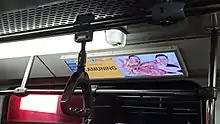
Tube (stylized TUBE), formerly called the Passenger Assist Railway Display System (PARDS), is a passenger information system currently deployed on certain lines of the Manila Light Rail Transit (LRT) and Metro Rail Transit (MRT) systems. Developed by Filipino technology companies TrackMate Business Solutions and PHAR Philippines,[1][2] the system was initially unveiled on May 5, 2017.
History
PARDS was created amid complaints from train passengers that they are unaware of what's going on while riding the system,[1] with a lack of information displays among their major complaints.[3]
The system was unveiled on May 5, 2017, with the system being installed on one Line 2 train.[4] By June 2017, all ten active train units were fitted with the system, with some 400 LCD monitors installed system-wide.[1] Installed at no cost to the national government, PARDS is funded through advertising.[1]
Although initially deployed on the Line 2, TrackMate also presented the system to the Light Rail Manila Corporation, the operator of Line 1, and to the Metro Rail Transit Corporation, operator of Line 3, eliciting a positive reaction.[1] TrackMate also claimed that there is interest in deploying PARDS internationally, as well as that there is potential in deploying it as a suitable low-cost alternative to traditional railway signalling systems.[1]
On March 28, 2019, an event was held announcing the system's rebranding to TUBE. In contrast to PARDS, TUBE features a redesigned interface and advertisements,[5] and during the event, Filipino Youtube personalities presented how the companies aimed to deploy the system to all three lines. PHAR and TrackMate have announced that Line 3 trains will be equipped with the system by April 2019, with the goal of having the system deployed on all three lines by July.[2]
Technology
TUBE uses GPS technology to determine a train's speed, location and other important information,[1] which helps determine a train's arrival and departure time.[4] Information from the train is uploaded to the cloud, which is then transmitted back to the train.[6]
Each TUBE-equipped train has been fitted with at least 40 LCD monitors which not only shows the train's location, but also news, public service announcements, passenger traffic and entertainment. The system is also capable of transmitting real-time information when circumstances require, such as in an emergency.[3]
TUBE also has a mobile component, where real-time train information can be accessed through a mobile application to be developed as part of the project's second phase, as well as a backend which allows the Light Rail Transit Authority to monitor train performance and passenger loads in real time.[1]
References
- 1 2 3 4 5 6 7 8 Dela Cruz, Roderick T. (September 2, 2017). "Filipinos tap GPS to change rail system". Manila Standard. Philippine Manila Standard Publishing, Inc. Retrieved March 27, 2018.
- 1 2 Galang, Vincent Mariel P. (March 27, 2019). "Passenger information system to be installed in LRT, MRT". BusinessWorld. BusinessWorld Publishing Corporation. Retrieved July 17, 2019.
- 1 2 Manabat, Jacque (May 5, 2017). "Line 2 unveils 'PARDS' for passengers". Business Nightly. ABS-CBN News Channel.
- 1 2 Nano, Joan (May 5, 2017). "New system can determine arrival and departure time of Line 2 trains". UNTV News and Rescue. Retrieved March 27, 2018.
- ↑ "Brand & Business: Manila Gets its First Ever In-Train TV Network with TUBE, Installed in MRT and LRT Lines". Adobo Magazine. Sanserif, Inc. April 1, 2019. Retrieved July 17, 2019.
- ↑ Ignacio, Reicelene Joy (May 6, 2017). "Train passengers get real-time news onboard". The Manila Times. Manila Times Publishing Corporation. Retrieved March 27, 2018 – via PressReader.